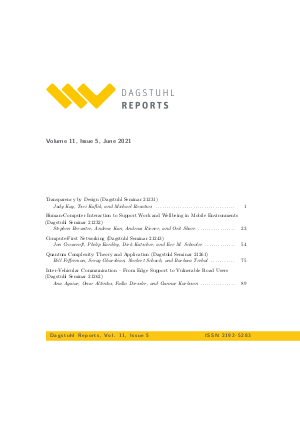Dagstuhl Reports, Volume 11, Issue 5
-
Part of:
Volume:
Dagstuhl Reports, Volume 11
Journal: Dagstuhl Reports (DagRep)

Event
- Dagstuhl Seminars 21231, 21232, 21243, 21261, 21262
Publication Details
- published at: 2021-12-01
- Publisher: Schloss Dagstuhl – Leibniz-Zentrum für Informatik
- DBLP: db/journals/dagstuhl-reports/dagstuhl-reports11
Access Numbers
- Detailed Access Statistics available here
-
Total Document Accesses (updated on a weekly basis):
0PDF Downloads
Documents
Dagstuhl Reports, Volume 11, Issue 5, May 2021, Complete Issue
Abstract
Cite as
Dagstuhl Reports, Volume 11, Issue 5, pp. 1-98, Schloss Dagstuhl – Leibniz-Zentrum für Informatik (2021)
Copy BibTex To Clipboard
@Article{DagRep.11.5,
title = {{Dagstuhl Reports, Volume 11, Issue 5, May 2021, Complete Issue}},
pages = {1--98},
journal = {Dagstuhl Reports},
ISSN = {2192-5283},
year = {2021},
volume = {11},
number = {5},
publisher = {Schloss Dagstuhl -- Leibniz-Zentrum f{\"u}r Informatik},
address = {Dagstuhl, Germany},
URL = {https://drops.dagstuhl.de/entities/document/10.4230/DagRep.11.5},
URN = {urn:nbn:de:0030-drops-155668},
doi = {10.4230/DagRep.11.5},
annote = {Keywords: Dagstuhl Reports, Volume 11, Issue 5, May 2021, Complete Issue}
}
Dagstuhl Reports, Table of Contents, Volume 11, Issue 5, 2021
Abstract
Cite as
Dagstuhl Reports, Volume 11, Issue 5, pp. i-ii, Schloss Dagstuhl – Leibniz-Zentrum für Informatik (2021)
Copy BibTex To Clipboard
@Article{DagRep.11.5.i,
title = {{Dagstuhl Reports, Table of Contents, Volume 11, Issue 5, 2021}},
pages = {i--ii},
journal = {Dagstuhl Reports},
ISSN = {2192-5283},
year = {2021},
volume = {11},
number = {5},
publisher = {Schloss Dagstuhl -- Leibniz-Zentrum f{\"u}r Informatik},
address = {Dagstuhl, Germany},
URL = {https://drops.dagstuhl.de/entities/document/10.4230/DagRep.11.5.i},
URN = {urn:nbn:de:0030-drops-155679},
doi = {10.4230/DagRep.11.5.i},
annote = {Keywords: Table of Contents, Frontmatter}
}
Transparency by Design (Dagstuhl Seminar 21231)
Abstract
Cite as
Judy Kay, Tsvi Kuflik, and Michael Rovatsos. Transparency by Design (Dagstuhl Seminar 21231). In Dagstuhl Reports, Volume 11, Issue 5, pp. 1-22, Schloss Dagstuhl – Leibniz-Zentrum für Informatik (2021)
Copy BibTex To Clipboard
@Article{kay_et_al:DagRep.11.5.1,
author = {Kay, Judy and Kuflik, Tsvi and Rovatsos, Michael},
title = {{Transparency by Design (Dagstuhl Seminar 21231)}},
pages = {1--22},
journal = {Dagstuhl Reports},
ISSN = {2192-5283},
year = {2021},
volume = {11},
number = {5},
editor = {Kay, Judy and Kuflik, Tsvi and Rovatsos, Michael},
publisher = {Schloss Dagstuhl -- Leibniz-Zentrum f{\"u}r Informatik},
address = {Dagstuhl, Germany},
URL = {https://drops.dagstuhl.de/entities/document/10.4230/DagRep.11.5.1},
URN = {urn:nbn:de:0030-drops-155685},
doi = {10.4230/DagRep.11.5.1},
annote = {Keywords: Artificial Intelligence, Dagstuhl Seminar, Ethics, Human-ComputerInteraction, Software Engineering, Transparency}
}
Human-Computer Interaction to Support Work and Wellbeing in Mobile Environments (Dagstuhl Seminar 21232)
Abstract
Cite as
Stephen Brewster, Andrew Kun, Andreas Riener, and Orit Shaer. Human-Computer Interaction to Support Work and Wellbeing in Mobile Environments (Dagstuhl Seminar 21232). In Dagstuhl Reports, Volume 11, Issue 5, pp. 23-53, Schloss Dagstuhl – Leibniz-Zentrum für Informatik (2021)
Copy BibTex To Clipboard
@Article{brewster_et_al:DagRep.11.5.23,
author = {Brewster, Stephen and Kun, Andrew and Riener, Andreas and Shaer, Orit},
title = {{Human-Computer Interaction to Support Work and Wellbeing in Mobile Environments (Dagstuhl Seminar 21232)}},
pages = {23--53},
journal = {Dagstuhl Reports},
ISSN = {2192-5283},
year = {2021},
volume = {11},
number = {5},
editor = {Brewster, Stephen and Kun, Andrew and Riener, Andreas and Shaer, Orit},
publisher = {Schloss Dagstuhl -- Leibniz-Zentrum f{\"u}r Informatik},
address = {Dagstuhl, Germany},
URL = {https://drops.dagstuhl.de/entities/document/10.4230/DagRep.11.5.23},
URN = {urn:nbn:de:0030-drops-155693},
doi = {10.4230/DagRep.11.5.23},
annote = {Keywords: (Productive) Work, Ergonomics, Human-computer interaction, Wellbeing}
}
Compute-First Networking (Dagstuhl Seminar 21243)
Abstract
Cite as
Jon Crowcroft, Philip Eardley, Dirk Kutscher, and Eve M. Schooler. Compute-First Networking (Dagstuhl Seminar 21243). In Dagstuhl Reports, Volume 11, Issue 5, pp. 54-75, Schloss Dagstuhl – Leibniz-Zentrum für Informatik (2021)
Copy BibTex To Clipboard
@Article{crowcroft_et_al:DagRep.11.5.54,
author = {Crowcroft, Jon and Eardley, Philip and Kutscher, Dirk and Schooler, Eve M.},
title = {{Compute-First Networking (Dagstuhl Seminar 21243)}},
pages = {54--75},
journal = {Dagstuhl Reports},
ISSN = {2192-5283},
year = {2021},
volume = {11},
number = {5},
editor = {Crowcroft, Jon and Eardley, Philip and Kutscher, Dirk and Schooler, Eve M.},
publisher = {Schloss Dagstuhl -- Leibniz-Zentrum f{\"u}r Informatik},
address = {Dagstuhl, Germany},
URL = {https://drops.dagstuhl.de/entities/document/10.4230/DagRep.11.5.54},
URN = {urn:nbn:de:0030-drops-155706},
doi = {10.4230/DagRep.11.5.54},
annote = {Keywords: Distributed Machine Learning, distributed systems, edge-computing, in-network computing, networking}
}
Quantum Complexity: Theory and Application (Dagstuhl Seminar 21261)
Abstract
Cite as
Bill Fefferman, Sevag Gharibian, Norbert Schuch, and Barbara Terhal. Quantum Complexity: Theory and Application (Dagstuhl Seminar 21261). In Dagstuhl Reports, Volume 11, Issue 5, pp. 76-88, Schloss Dagstuhl – Leibniz-Zentrum für Informatik (2021)
Copy BibTex To Clipboard
@Article{fefferman_et_al:DagRep.11.5.76,
author = {Fefferman, Bill and Gharibian, Sevag and Schuch, Norbert and Terhal, Barbara},
title = {{Quantum Complexity: Theory and Application (Dagstuhl Seminar 21261)}},
pages = {76--88},
journal = {Dagstuhl Reports},
ISSN = {2192-5283},
year = {2021},
volume = {11},
number = {5},
editor = {Fefferman, Bill and Gharibian, Sevag and Schuch, Norbert and Terhal, Barbara},
publisher = {Schloss Dagstuhl -- Leibniz-Zentrum f{\"u}r Informatik},
address = {Dagstuhl, Germany},
URL = {https://drops.dagstuhl.de/entities/document/10.4230/DagRep.11.5.76},
URN = {urn:nbn:de:0030-drops-155715},
doi = {10.4230/DagRep.11.5.76},
annote = {Keywords: complexity theory, many-body systems, proof and verification systems, quantum computation, quantum supremacy}
}
Inter-Vehicular Communication - From Edge Support to Vulnerable Road Users (Dagstuhl Seminar 21262)
Abstract
Cite as
Ana Aguiar, Onur Altintas, Falko Dressler, and Gunnar Karlsson. Inter-Vehicular Communication - From Edge Support to Vulnerable Road Users (Dagstuhl Seminar 21262). In Dagstuhl Reports, Volume 11, Issue 5, pp. 89-96, Schloss Dagstuhl – Leibniz-Zentrum für Informatik (2021)
Copy BibTex To Clipboard
@Article{aguiar_et_al:DagRep.11.5.89,
author = {Aguiar, Ana and Altintas, Onur and Dressler, Falko and Karlsson, Gunnar},
title = {{Inter-Vehicular Communication - From Edge Support to Vulnerable Road Users (Dagstuhl Seminar 21262)}},
pages = {89--96},
journal = {Dagstuhl Reports},
ISSN = {2192-5283},
year = {2021},
volume = {11},
number = {5},
editor = {Aguiar, Ana and Altintas, Onur and Dressler, Falko and Karlsson, Gunnar},
publisher = {Schloss Dagstuhl -- Leibniz-Zentrum f{\"u}r Informatik},
address = {Dagstuhl, Germany},
URL = {https://drops.dagstuhl.de/entities/document/10.4230/DagRep.11.5.89},
URN = {urn:nbn:de:0030-drops-155722},
doi = {10.4230/DagRep.11.5.89},
annote = {Keywords: vehicular networks, vulnerable road users, edge computing, intelligent transportation systems}
}